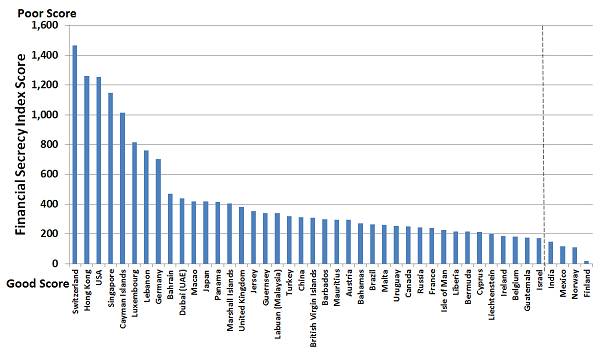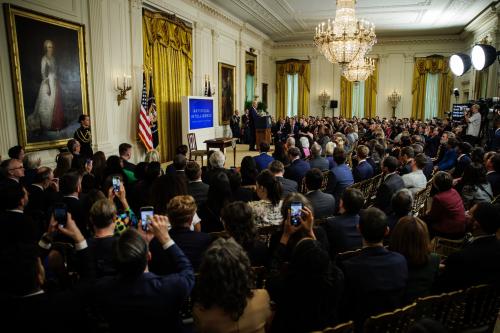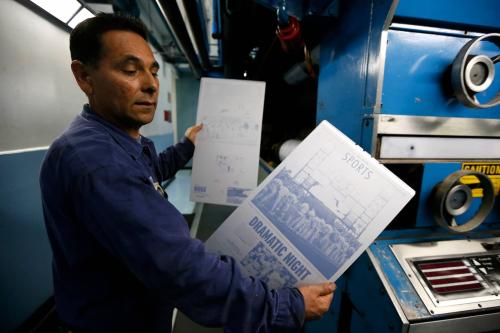The leaked information in the Panama Papers from the law firm Mossack Fonseca has captured the headlines for weeks and will continue to do so as further names are exposed. The scandal has placed Panama in the limelight and provided an unprecedented glimpse into the world of hidden money and tax avoidance. To understand its broader context, it is vital that we distinguish between legal corruption, like that exposed by the Panama Papers, and illegal corruption, like that exposed by the Unaoil scandal. Governments must seize the moment to take decisive action against both.
The U.S., the U.K., and a range of other countries will announce commitments to combat corruption at the Anti-Corruption Summit on May 12, championed by Prime Minister David Cameron as a game-changing event. The question is whether these commitments will deliver concrete actions that target the most costly kinds of corruption that flourish globally today.
Unfortunately, the world often engages in “summitry” filled with communiques, calls for coordination and exchanging information, or creating another toothless generic initiative, which offer media and photo opportunities that fulfill particular political objectives for some leaders. Let us see if it’s different this time.
Beyond Panama
Mossack Fonseca, and its home country Panama, are just a couple nodes in the vast and complex set of “enablers” of corruption and tax evasion around the world.
For those seeking secret shelters and corporate shells, the mighty U.S. (which unsurprisingly doesn’t feature much in the Panama Papers) is one of the world’s most appealing destinations: Setting up a shell corporation in Delaware, for instance, requires less background information than obtaining a driver’s license. As seen in the chart below, this opacity, coupled with the size of the U.S. as a haven, means that it has been ranked the third most secretive jurisdiction among close to 100 assessed by the Financial Secrecy Index. Panama is 13th.
Figure 1: Financial Secrecy Index 2015 (Select jurisdictions, from the Tax Justice Network)

Source: The Tax Justice Network’s Financial Secrecy Index http://www.financialsecrecyindex.com/introduction/fsi-2015-results
This graph depicts the top 40 worst performing jurisdictions as well as four select better performing jurisdictions (right of dashed line). The Index combines a qualitative secrecy score based on 15 indicators and a quantitative measure of a jurisdiction’s share in global financial services exports.
And the U.K. is an important enabler of corruption: It has stood by as its offshore jurisdictions and protectorates operate as safe havens for illicit wealth, which the Panama Papers make clear. The British Virgin Islands, for example, were the favored location for thousands of shell companies set up by Mossack Fonseca.
Beyond tax shelters
The Panama Papers speak only indirectly to core aspects of today’s global corruption challenge, which are neither about Panama nor taxes. We ought to view the resulting scandals in a broader light, and recognize the immense, complex webs of corruption that increasingly link economic and political elites around the globe.
Grand corruption
The most powerful figures who engage in high-level or “grand” corruption are hardly running scared following the Panama leak. These figures include kleptocrat leaders as well as oligarchs who wield enormous influence on government affairs. Often, these players interact and collude, forming high-powered public-private networks that make the traditional notion of corruption as an illegal transaction between two parties look like child’s play.
Corruption in these elite networks far transcends the unethical behavior of the typical tax avoider, as it involves the abuse of power to accumulate power and assets, often via the direct plunder of public resources, asset stripping, or large-scale bribery. The multi-billion-dollar scandal embroiling the Brazilian oil giant Petrobras illustrates the complexity of colluding networks, and how grand such corruption can inflict political and economic damage of historical proportions on a country.
The oil sector provides many more illustrations of grand corruption. Few company officials may have been more relieved by the Panama Papers leak than those at Unaoil, whose own scandal had just erupted. Unaoil is an “enabler” company incorporated in Monaco that bribed and influenced government officials in various countries on behalf of multinational companies vying for lucrative procurement contracts. While overshadowed by the Panama leaks, the Unaoil case is at least as emblematic of the challenges in tackling global corruption. For instance, it shows the deeply ingrained practice of Iraqi government officials seeking bribes for the award of contracts and the willingness of companies to provide them.
Corrupt elites, including those embroiled in the Unaoil scandal, often use structures like shell corporations and tax havens (along with real estate and other investments) to hide their ill-gotten funds. However, even if the Panama Papers leak prompts more scrutiny on illicit financial flows and the reform of these opaque financial structures, grand corruption will continue in many locations. It is noteworthy that the political fallout has been concentrated in relatively well-governed countries that do have accountability and anti-corruption systems in place, as illustrated by the resignations of the prime minister of Iceland, the industry minister of Spain, and the head of Chile’s Transparency International chapter.
In sharp contrast, President Vladimir Putin brushed off the leaked Russian information as a Western anti-Putin conspiracy; in China, discussion and dissemination were muffled by media censorship; and, in Azerbaijan, exposure of details on President Aliyev’s family mining interests will hardly dent his hold on power. While reforms leading from the Panama leaks will hopefully deter tax dodgers and unethical corporations and individuals from hiding dirty assets, powerful corrupt leaders will continue to enjoy impunity.
Legal corruption and state capture
The Panama Papers shed a sliver of light on the type of corruption that is perhaps most damaging and difficult to tackle: legal corruption and state capture. Around the world, powerful economic and political elites unduly influence laws and policies, shaping the rules of the game for their own benefit, or what has been called the “privatization of public policy and lawmaking.” This generates huge rents for the elite, increases their power, and exacerbates a country’s political and economic inequality.
Resource-rich countries provide many illustrations. In Angola, the Democratic Republic of Congo, Nigeria, and Venezuela, for example, political elites have used state-owned resource companies to serve patronage agendas, often—though not exclusively—through legal means.
In many industrialized countries, an example of state capture is the tax system itself. It is in the interest of elites to safeguard a worldwide network of secret offshore companies and tax havens as places to hide wealth—whether acquired legitimately or illicitly. The evidence on tax avoidance from the U.S. is telling: According to Zucman, since the 1950s the effective rate of corporate tax has decreased from 45 to 15 percent, whereas the nominal rate has only decreased from 50 to 35 percent. And U.S. companies make full use of foreign tax havens: According to a new Oxfam report, the top 50 American multinationals reported in 2008 that 43 percent of their foreign earnings came from five tax havens, accounting for only 4 percent of the companies’ foreign workforces. Further, Bourguignon reports that federal tax rates on the richest Americans fell by 15 percent between 1970 and 2004.
Risks of legal corruption in the U.S. run high because private money can so easily sway public affairs. Following the 2010 Citizen United ruling by the Supreme Court, private funds from deep pockets increasingly dominate the conduct of electoral campaigns. The avenues for private money to influence public officials may widen further, if forms of bribery traditionally considered illegal become legalized. A forthcoming Supreme Court decision could make it legal for public officials to receive gifts and other benefits from private individuals (potentially overturning the corruption conviction of a former Virginia governor for doing exactly that).
What should be done?
Upfront, there are no easy solutions, especially because powerful decision-makers benefit from this status quo. But there is the opportunity, and public pressure, to reform. As mentioned, the cause of tackling corruption often attracts token gestures, and David Cameron’s announcement of a new global anti-corruption agency could be at high risk of falling into this category. Rather, countries like the U.S. and U.K. must take firm action to reform their own practices, and push for the same from their partners such as the U.K. crown dependencies and overseas territories, the European Union and G20 members, and the recipients of overseas aid.
First, take legal corruption and state capture seriously.
Transparency can be one game changer, especially if it addresses the channels of influence through which policy becomes “privatized.” Disclosures of campaign finance contributions, conflicts of interests, assets held by (and tax returns filed by) politicians and public officials, and parliamentary deliberations and votes can all discourage abuse and reveal hidden networks at play. Encouragingly, the Organisation for Economic Co-operation and Development (OECD) recently issued their first salvo, the report “Financing Democracy,” focusing on a few selected case studies, and as a next step it should be empowered to develop standards and carry out assessments on political finance for all OECD countries.
Transparency will only help if citizens can actively scrutinize and engage with their governments. Civic space is under attack in many jurisdictions, with activists and journalists facing intimidation, prosecution, or worse. Securing rights of expression and assembly should be the business of any international actor concerned with anti-corruption or economic governance. For instance, when considering funding requests from governments with weak records on protecting civil society—like Angola and Azerbaijan—the World Bank and International Monetary Fund as well as donors like the U.S. should prioritize civic accountability as well as broader transparency reforms.
Furthermore, grand corruption will not decline without more effective prosecutions and other sanctions that target bribe-takers, as well as the facilitators and middlemen of corruption, be they lawyers, accountants, or fixers like Unaoil. Of course, law enforcement authorities should also remain vigilant against bribe-paying companies; and governments—including OECD members implementing to varying degrees the OECD foreign bribery convention—would do well to emulate the active enforcement of the U.S. Foreign Corrupt Practices Act (FCPA) in this regard. But bribe-takers and facilitators have not faced sufficient scrutiny and sanction.
Second, get rid of shadowy corners.
Lessons yielded by recent events from the 2008 financial crisis to the Panama Papers suggest that major global players should not allow large corners of the global economy to escape scrutiny. The U.S. and the U.K. (with its offshores), should heed the calls for dismantling secrecy and tax havens. Seeds of effort, such as the U.S. government’s decision to require banks to know the identities of the individuals behind shell companies, are now coming to light, but broader efforts, including legislation, will also be required.
Beneficial ownership transparency should become standard operating procedure, with governments following the example of the U.K., the Netherlands, and others in setting up public registries, and joining the movement toward a global registry. In the case of resource-rich countries, establishing sector-specific registries may be the right place to start. This practice is now mandated by the Extractive Industries Transparency Initiative.
Within the extractive sector, home country governments should subject commodity traders to payment disclosure requirements when doing business with governments and state-owned companies. Governments of countries like Switzerland, the U.K., and Singapore that are home to corporate actors shoulder significant responsibility, especially in the current era of low commodity prices, when traders are entering into profitable new deals with cash-strapped resource-producing countries. Shining light in dark corners like these will render them less susceptible to abuse.
Third, prioritize transparency and scrutiny when public resources are allocated.
Whenever a government allocates resources for exploitation, it ought to do so in a fully transparent fashion. The Open Contracting Partnership has made great strides in defining a gold standard for such reporting, including guidance on issues such as open data, corporate identifiers, and beneficial ownership reporting.
Natural Resource Governance Institute research on oil and mining sector corruption shows that multiple types of high-value allocations require scrutiny and contract disclosure. These include the allocation of exploration and production licenses, but also on export, import, or transport rights, which have been associated with corruption in countries such as Indonesia, the Republic of Congo, and Ukraine. And most of the oil sector cases prosecuted under the U.S. FCPA have arisen around the award of service contracts, a segment of the oil industry where the Unaoil and Petrobras scandals also took place. Transparency should be the default setting for any transactions that allocate public resources. Further scrutiny is also needed on the abuse of (mis-)managed exchange rate regimes that generates rents for the few and creates major economic distortions, such as currently in Nigeria, Venezuela, and Egypt.
Concrete impact will also require a major attack on impunity since transparency and freedom of expression are necessary, but insufficient. And governments including those of the U.S. and the U.K. should adopt reforms to address legal corruption and various forms of opacity—whether addressing the capture by money in politics or the “dark corners” among oil traders headquartered in Geneva and London.
An ambitious commitment to tackling corruption and impunity is not only needed now, but demanded by societies, as events in Brazil and elsewhere show. This is a potentially “game-changing” global moment to make real progress.



Commentary
From Panama to London: Legal and illegal corruption require action at the UK anti-corruption summit
May 9, 2016